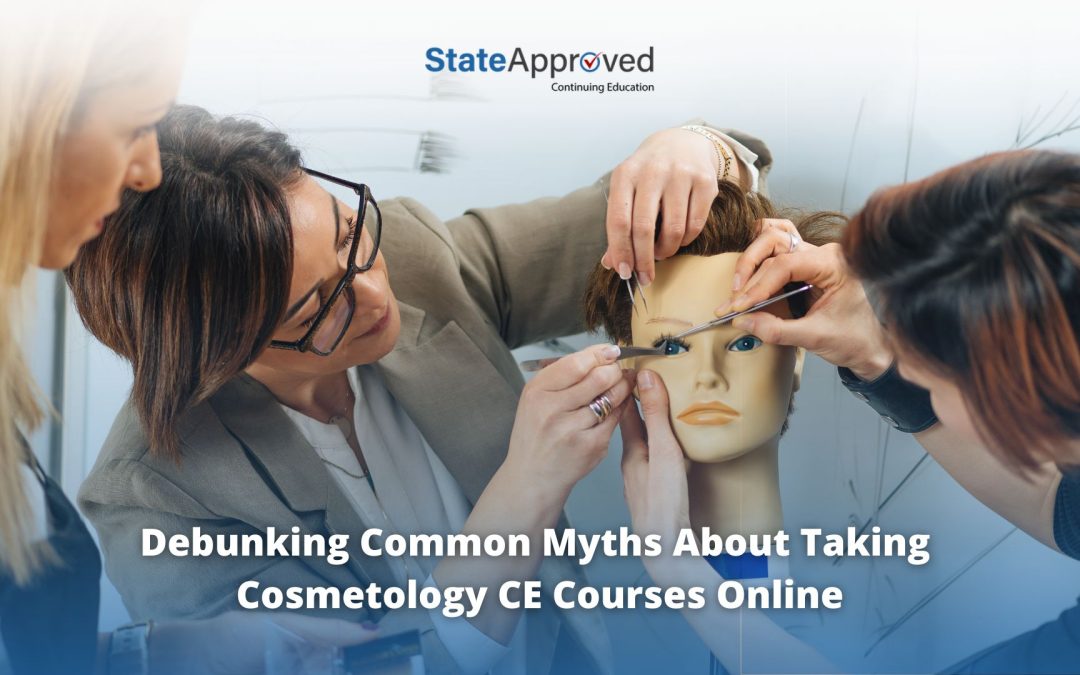Many people feel unsure about taking cosmetology continuing education (CE) courses online, often due to common myths and misunderstandings. These misconceptions can lead to confusion and hesitation. This blog aims to debunk the most widespread myths about online CE courses, offering clear and accurate information to help you decide with confidence.
Key Takeaways
- Online cosmetology CE courses are recognized by licensing boards, making them a valid option for fulfilling renewal requirements.
- These courses offer high-quality content with practical experiences, often utilizing advanced technology to enhance learning.
- Affordable and flexible, online CE courses allow beauty professionals to learn at their own pace without the pressures of high-stakes exams.
Myth: Online Cosmetology CE Courses Are Not Recognized by Licensing Boards
It is a common misconception that online courses for cosmetology continuing education (CE) are not accepted by state licensing boards. This belief is incorrect, as numerous state licensing bodies, such as the Texas Department of Licensing and Regulation (TDLR), do endorse online classes in this field. Beauty professionals must frequently update their cosmetology license every one to two years, and many states accept credit from online courses offered by accredited cosmetology schools to fulfill these licensure requirements without necessitating physical presence.
The process of maintaining one’s credentials typically entails completing a certain number of hours in approved educational activities, which may be obtained through authorized online courses as per various state board directives. While cost-free options might seem appealing, they don’t always conform to the necessary standards set forth by state authorities for CE units. It’s crucial for individuals seeking continued education to select programs that have been acknowledged by their respective regional licensure organizations. Understanding how often cosmetologists have to renew their license to stay compliant and certified is essential for ensuring uninterrupted professional practice.
For beauty industry members with packed schedules, pursuing CE through virtual platforms can serve as an effective means of meeting mandated learning criteria while accommodating other commitments. They offer equivalent validity compared to traditional on-site sessions when it comes time for accreditation towards professional certification upkeep. The flexibility inherent in digital classroom settings allows personal adjustment between vocational duties and scholastic endeavors.
Read more: Renew a Cosmetology License in Texas
Myth: Online CE Courses Lack Quality and Depth
The notion that online continuing education (CE) courses in the beauty industry are substandard is a misunderstanding. In truth, these online offerings can be rich and thorough. Featuring video tutorials and live demonstrations by seasoned professionals, such courses deliver instruction of a high caliber. The aim is to supply an all-encompassing range of educational materials that can match or even exceed what’s found in conventional classroom environments.
To improve how learners absorb information, many online learning platforms incorporate cutting-edge technologies like artificial intelligence and interactive interfaces. These innovations provide custom training experiences suited to distinct styles of learning, making the educational content more captivating and impactful. Interactive assessments play a crucial role in ensuring active engagement with the material being taught, thereby boosting comprehension and retention of intricate subjects.
Diving into an extensive repository of knowledge has never been easier, thanks to online CE courses tailored for those keen on mastering beauty skills, including skincare techniques, all available at your convenience through digital access points. From step-by-step guides to hands-on evaluations, these resources are crafted meticulously with one goal: equipping you thoroughly for meeting the diverse demands posed by work within both broader sectors—the world of beauty—and specialized niches therein.
Myth: You Can’t Get Practical Experience from Online CE Courses
The common misconception that online continuing education courses lack opportunities for practical experience is unfounded. In truth, numerous online courses in the realm of continuing education are structured to include hands-on tasks and assignments aimed at cultivating real-world skills. These activities mimic actual industry situations, equipping learners with relevant experiences that can be seamlessly applied within their professional environments.
Online CE courses often feature video tutorials showcasing techniques and processes as they pertain to tangible applications where learning occurs. Such resources enable you to absorb and master these methods at your own pace before implementing them in genuine scenarios. Some offerings include interactive elements that allow students to actively engage with content, refining their practical abilities.
Given the importance of hands-on expertise in many industries, securing training that prepares individuals for authentic life experiences is crucial. Online continuing education programs are crafted with this necessity in mind. They employ a range of strategies designed not just to impart knowledge but also to ensure participants acquire the necessary experiential competence required for career advancement.
Read More: Skills Every Cosmetologist Needs and Why Continuing Education Matters
Myth: Online Learning Is Too Expensive
The idea that online learning necessitates a substantial financial investment is a misconception. A multitude of continuing education courses are offered online at extremely affordable rates, with some available for as little as $15. This presents a cost advantage over traditional classroom settings, which often incur extra expenses such as travel and accommodation, at the cost of course materials.
Continuing education across various disciplines demonstrates that it can be both economical and accessible. Opting for online courses allows individuals to enhance their expertise and develop new skills without exhausting their finances. Consequently, this efficiency in cost makes continued educational pursuits more attainable for an increased number of beauty professionals.
By embracing online education platforms, professionals gain access to high-caliber instruction while conserving funds—a stark contrast to the steeper costs associated with conventional face-to-face learning modalities. Such economic accessibility empowers a greater cohort of practitioners within the beauty industry to maintain updated knowledge and competencies without fiscal hardships.
Myth: Online CE Courses Are Not Flexible
The ability to learn flexibly is a key benefit of online education, though some have reservations about the adaptability of online Continuing Education (CE) courses. Cosmetology school programs available online are intentionally crafted to provide the necessary flexibility for professionals juggling their careers, family obligations, and educational pursuits. These individuals can freely access learning materials at any time from any location, granting them the opportunity to review lessons and enhance their cosmetology skills according to their personal rhythm.
Online courses’ self-directed nature empowers learners to integrate study sessions within their existing schedules. Online education accommodates those who must navigate dense workloads or tend to family duties by integrating seamlessly into one’s daily routine and offering a chance to conserve valuable time. This adaptability significantly alleviates pressure and enriches both the enjoyment and efficacy of the educational process.
In today’s fast-paced environment where every moment counts, the flexibility afforded by online CE classes cannot be overstated. Such convenience enables professionals not only to meet licensing prerequisites but also aligns with stringent job demands, promoting ongoing professional development as well as success in their respective fields.
Read More: Top Benefits of Continuing Education for Cosmetology Professionals
Myth: Online CE Courses Require High-Stakes Exams
Many individuals harbor the misconception that high-stakes testing is a requisite component of online continuing education (CE) courses, but this notion is unfounded. A significant number of these courses place a greater emphasis on reading comprehension and practical application in essential fields, rather than on conventional exams or quizzes. The aim here is to ensure students genuinely grasp the subject matter instead of merely focusing on test scores.
In some CE programs recognized by states, traditional quizzes and examinations are omitted from the syllabus altogether. These programs emphasize the importance of substantial reading materials and hands-on knowledge to foster engagement among adult learners without the added tension associated with rigorous testing regimes. This educational methodology encourages thorough study along with direct practical experience as opposed to gauging progress through examination outcomes within science-related curricula.
Take, for instance, Texas’ CE offerings, which do not incorporate any tests at all. Providing professionals with an opportunity for ongoing education free from exam-induced anxiety. Such developments in online CE course structures signal a move towards more effective pedagogical strategies where mastery and real-world application take precedence over mere assessment scores.
Read more: The Critical Importance of Cosmetology Continuing Education in Texas
Benefits of Taking Online Cosmetology CE Courses
Engaging in online cosmetology continuing education (CE) courses presents a wealth of benefits and advantages, greatly influencing the advancement of beauty professionals. Through these virtual learning opportunities, individuals can acquire up-to-date information on cutting-edge techniques and prevailing safety protocols from virtually any location. This access enables practitioners within the beauty industry to remain abreast of evolving trends and established best practices.
Offered through various user-centric formats for simplified absorption, online CE courses also frequently incorporate invaluable additional resources such as business acumen or targeted health-related training. By continually improving your expertise and capabilities, you equip yourself with tools that not only improve service quality but also fortify your competitive stance in the realm of beauty services—a critical component for ongoing educational endeavors, seen as an essential seminar.
Such digital platforms provide tailor-made continuing education programs that focus explicitly on nurturing professional skills, facilitating intensive concentration on specific areas like advanced coloring principles or leveraging social media effectively as a makeup artist. The expansion of one’s skill repertoire via this route not only refines existing competencies but also paves avenues toward novel vocational prospects within the dynamic sphere of the beauty industry, with all pivotal aspects ranging from alternative career pathways to job security considerations.
Read more: Top 5 Benefits of Taking Cosmetology Courses Online
How to Choose the Right Online Cosmetology CE Course
Ensuring that you select an appropriate online course for cosmetology continuing education is essential to fulfilling both your professional objectives and the licensing mandates of your field. As certain licensing boards endorse specific online courses for CEU accreditation, it’s imperative to examine local stipulations and confirm that any chosen course has recognition from your state’s regulatory board.
To affirm if a course holds legitimacy, investigate whether it possesses a provider number along with state registration. This critical step will ascertain the accredited status of the educational offering, thereby guaranteeing its contribution towards not only continuing education credits but also maintaining an active licensed status required for certification attainment.
Establishing clear targets related to what advancements you wish to achieve through continuing education can greatly benefit progress in terms of acquiring novel skills or boosting business acumen. With these guidelines in place, selecting an online cosmetology CE course becomes a process aligned with furthering career growth while complying fully with all relevant licensure prerequisites.
Read More: Top Tips for Choosing the Right CE Course for You
Debunking the Myths and Unlocking Opportunities
Online cosmetology continuing education courses are not just convenient; they’re a game-changer for beauty professionals. By addressing common myths, it’s clear that these courses provide comprehensive learning, flexibility, and unmatched accessibility, making them an ideal way to stay compliant while expanding your expertise. The convenience of learning at your own pace, combined with top-tier, state-approved content, ensures that you can balance professional growth with your busy schedule.
If you’re ready to take the next step in your career, we’re here to help. At State Approved Continuing Education, our cosmetology continuing education online Texas courses are designed to support your licensing requirements while enabling you to master industry trends. We also offer courses for auctioneers, electricians, and well drillers to ensure professionals remain compliant and enhance their skills. Whether you need to meet TDLR regulations or wish to refine your skills, our courses offer the knowledge and tools you need to succeed. Contact us today and take the next step in your professional development with confidence.
Frequently Asked Questions
Are online cosmetology CE courses recognized by licensing boards?
Absolutely, many online cosmetology CE courses are recognized by state licensing boards, such as the Texas Department of Licensing and Regulation. Just be sure to check if the specific course you choose is approved in your state!
Do online CE courses provide practical experience?
Absolutely, many online CE courses include hands-on exercises and simulations to help you gain practical experience. This approach ensures that you can apply what you learn in real-world situations.
Do online CE courses require high-stakes exams?
Most online CE courses don’t require high-stakes exams; they often emphasize understanding and applying the material instead. It’s a more relaxed approach to learning!
How can I choose the right online cosmetology CE course?
To choose the right online cosmetology CE course, start by reviewing your state regulations and ensuring the course is accredited. Setting clear goals for what you want to achieve will also guide your decision effectively.



